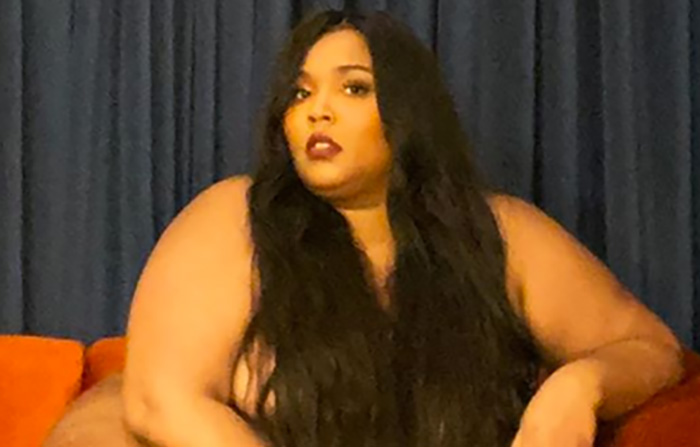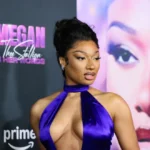 Once a foul-mouthed tough chick with a chip on her shoulder, Nicki Minaj has blossomed into one of rap’s most arresting emcees. Now, she’s ready to prove herself with the release of her highly anticipated debut, Pink Friday.
Once a foul-mouthed tough chick with a chip on her shoulder, Nicki Minaj has blossomed into one of rap’s most arresting emcees. Now, she’s ready to prove herself with the release of her highly anticipated debut, Pink Friday.Today, Nicki clicks her black stiletto heels into a bright studio in Manhattan’s Garment District. She dismisses an egg white breakfast that isn’t to her liking and sifts through a rack of couture, giving the green light to select designs. A personal handler – one of the many on her team – clears the set to make her comfortable as she ducks behind a curtain for makeup and pampering.
Ever since her mentor Lil Wayne welcomed her to his testosterone-fueled Young Money gang on the strength of her DVD appearance, the 25-year-old has sped down the hip-hop highway to become the new decade’s first rap diva. Over the past year, Nicki became the first solo female emcee to top the Rap Songs chart since 2002 with the saccharine “Your Love,” effectively ending rap’s estrogen drought. In October, she shattered a Billboard record by becoming the first rapstress to simultaneously land seven songs (a combination of both solo and featured tracks) in the Hot 100 chart and sell a combined 4.29 million copies.
The numbers are on her side, but Judgment Day arrives on November 22, the day her hyped debut Pink Friday hits stores. Earlier this year, her Cash Money cohorts nudged her into the studio to begin cold recording the LP, attempting to capitalize on the buzz from animated verses on Ludacris’ platinum-certified “My Chick Bad” and Young Money’s “BedRock.” Initially, Nicki balked at the demand, worried that her talents were better suited for 16-bar guest contributions.
“I was so afraid to put out an album for fear of failure,” she later admits, stretched across a dressing room couch in a yellow Harajuku Lovers tee and flowing sweatpants. “I wanted to put my album out on Valentine’s Day of 2011. And my label was like, are you fucking crazy?”
With a fan base that’s expanded from hip-hop to mainstream pop (even Regis Philbin branded her “the next Lady Gaga” following a performance on his show), Nicki isn’t ditching her aggressive hood past. Pink Friday carefully straddles the line between boisterous hip-hop and glistening pop, boasting an eclectic roster of guests including Rihanna, will.i.am, Drake, Kanye West and Natasha Bedingfield.
“I’ve always been a fan,” says Nicki of Bedingfield, who appears on “Last Chance.” “I remember I had a job right here in Manhattan as an office manager and she had a song called ‘These Words.’ I played that song, I’m not kidding, about 50 times back to back, and this guy – it was such a small office – he couldn’t take it anymore. He was like, ‘How many times are you going to play that fucking song?’”
Pop has a heavy hand in Pink Friday, but Nicki panders to the hip-hop sect with harsh “Roman’s Revenge.” The track, which sports a wobbly electronic beat and saucy lyrics, pairs her gay alter ego Roman Zolanski with Eminem, who also used the beginning stage of his career to rap from the perspective of a character.
“We both have our own world, and we’re just colliding. I feel like we’re on a freaking collision course or something. But it’s very equal,” she explains. “I want a piece of that Slim Shady world because I feel like it may have subconsciously influenced me.”
Fans who have been lured into the Minaj matrix by her mystique will also see a more introspective side of the Harajuku Barbie on the album. Typically on wax, Nicki can flip from pointy and aggressive to British and ditzy over a span of two bars, leaving listeners in the dark about the girl behind the mic. One minute, she’s a squeaky British valley girl like on Mariah Carey’s “Up Out My Face (Remix),” and the next, she’s back to being Roman on Trey Songz’s “Bottoms Up.”
But where she used the bulk of her 2010 recordings to take listeners to metaphor heaven, she strips away the gloss and allows herself to become vulnerable for the first time since her stark 2008 track “Autobiography.” On “Dear Old Nicki,” for example, she addresses why she changed from the feisty around the way rap chick to female emcees’ saving grace.
“I’m going to talk about my family and a little bit of dysfunction – or I should say, lots of dysfunction. And I’m just going to talk about me and self-searching and why I made the choices [I did],” she says, differentiating between her aliases and Onika Tonya Maraj – her birth name. “Onika is not Nicki is not Roman. People will never be able to figure me out. I can tell you my whole life story from beginning to end, and then tomorrow, I’ll be just a different person.”
Her identity is as shape-shifting as her rainbow collection of wigs, but her history is written in stone. Growing up in Queens, New York, a young Onika attended the LaGuardia High School of Music & Art and Performing Arts (of which Fame was based), slinging her first rhyme to impress her next-door neighbor, Jennifer.
“I started saying it to everybody,” she says with a giggle. “I thought that they were laughing with me, but they were really laughing at me.”
Reared on a healthy diet of Slick Rick and Doug E. Fresh, Nicki spent her adolescence studying hip-hop and developing a taste for couture from admiring her supportive mother’s fashion expertise (“She was wearing only the flyest shoes and dresses”). But where she spent countless hours locked in her room penning rhymes, hip-hop became a necessary escape from life’s harsh realities. On “Autobiography,” Nicki details a traumatic episode where her substance-abusing father tried to burn the house down with her mother inside. It was one of the many situations that molded her into the hotheaded firecracker barking on The Come Up DVD.
It wasn’t until she met Wayne that she finally found a strong male figure capable of nurturing her love of rhyme. His oversight on her 2008 Sucka Free mixtape and her breakout 2009 tape Beam Me Up, Scotty not only cultivated her eccentricities, but also stamped her with a co-sign from a member of the hip-hop elite. Under the Young Money skein, the two joined forces with the rest of the squad to release We Are Young Money in December 2009, later earning gold certification for the album and a platinum plaque for “BedRock” in June.
But Nicki quickly learned a harsh lesson. Wayne could only take her so far as a solo artist, and his incarceration this past March left her and the YM camp to their own devices. His absence jolted her, not just on a personal level, but also taught her that making it to the top of the game doesn’t reward with automatic bulletproofing.
“At any given moment, you can experience your last day, whether it’s going to come back, as in his case, or whether it’s gone forever,” she slowly states, citing Remy Ma as another incarcerated emcee who often crosses her mind. “I can’t stop, I don’t know when this is going to end. I don’t know if this is going to end. I don’t know how long I’m going to have.”

![Da Brat Marries Judy Dupart on 2.22.22 [PHOTOS]](https://hiphopucit.com/wp-content/uploads/2022/02/1645669184565-440x264.jpeg)
![Drake Reveals Photos of His Son Adonis [Photos]](https://hiphopucit.com/wp-content/uploads/2020/03/Drake-and-on-Adonis-HHUCIT.jpg)

![Megan Thee Stallion – “BOA” [NEW VIDEO]](https://hiphopucit.com/wp-content/uploads/2024/05/Megan_Thee_Stallion___BOA__Official_Video__1_12_screenshot-440x264.jpg)
![Doechii Feat. JT – “Alter Ego” [NEW VIDEO]](https://hiphopucit.com/wp-content/uploads/2024/05/Screenshot-of-Doechii-and-JTs-Al-440x264.png)
![Young Thug Feat. Drake Drop – “Oh U Went” [NEW VIDEO]](https://hiphopucit.com/wp-content/uploads/2023/07/Young-Thug-and-Drake-1014x570-1-440x264.png)





![Rihanna & Donald Glover Shoot a Film in Cuba [PHOTOS]](https://hiphopucit.com/wp-content/uploads/2018/08/rihanna-donald-glover.jpg)




